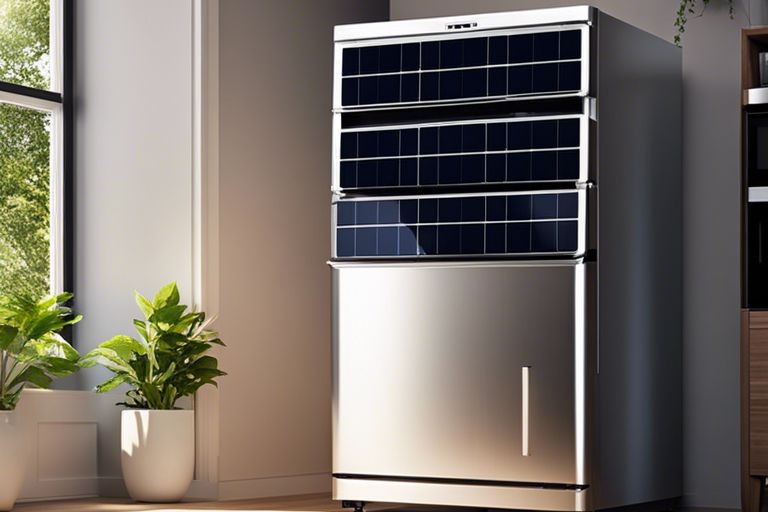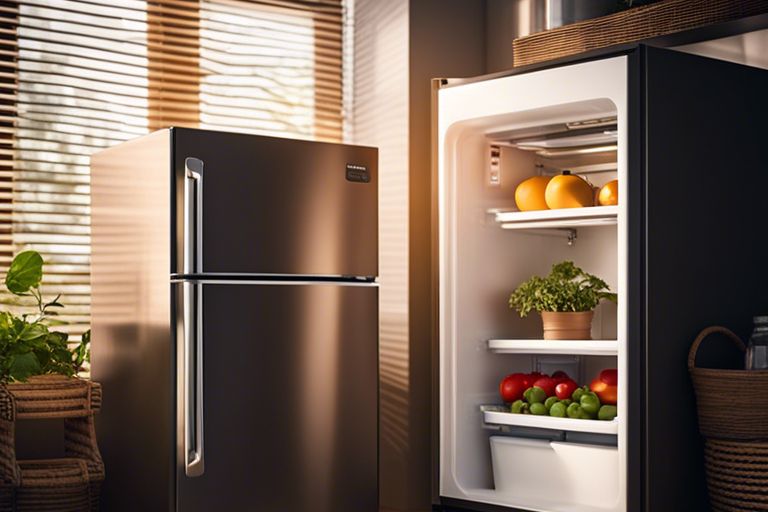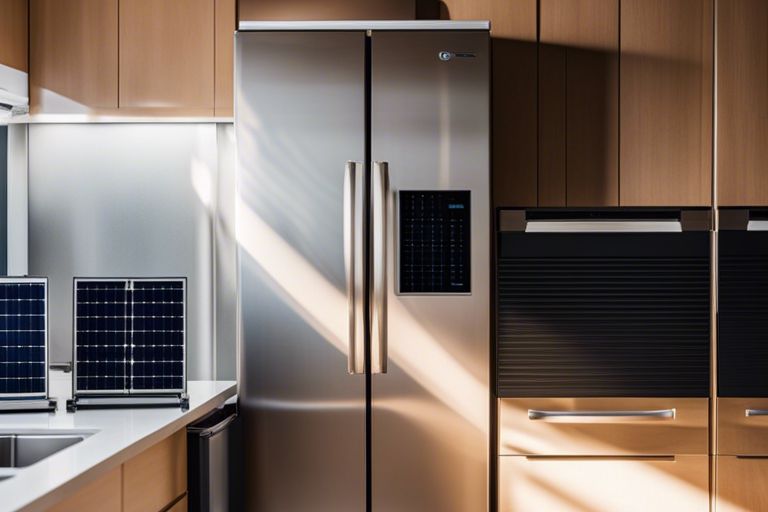Generator If you’re wondering if your solar generator can handle running a refrigerator, the answer is yes – with some considerations. In this guide, we’ll research into the power requirements of refrigerators, how solar generators work, and tips for optimizing the performance of your setup. To learn more about the comparison between a solar refrigerator and using a solar generator to power a refrigerator, check out this informative article on Solar Refrigerator vs. Solar Generator for Refrigerator.
Key Takeaways:
- Size of the solar generator matters: Make sure the solar generator has enough wattage and battery capacity to power a refrigerator.
- Consider the refrigerator’s energy usage: Look at the refrigerator’s wattage requirements to ensure the solar generator can handle the load.
- Efficiency of the refrigerator matters: Choose an energy-efficient refrigerator to minimize power consumption and increase the chances of running it on a solar generator.
- Proper maintenance is crucial: Regularly check and maintain the solar generator to ensure optimal performance when running a refrigerator.
- Use energy-saving strategies: Implement energy-saving practices such as adjusting thermostat settings and minimizing door openings to extend the run time of the refrigerator on a solar generator.
Solar Generator Basics
What is a Solar Generator?
Generator A solar generator is a portable power station that uses solar panels to capture and store energy from the sun. It consists of a solar panel to collect sunlight, a charge controller to regulate the charging of the battery, a battery to store the energy, and an inverter to convert the stored DC energy into AC power.
How Does it Work?
Solar When sunlight hits the solar panels, it creates an electric current that is then converted and stored in the battery as DC (direct current) energy. The charge controller ensures that the battery is not overcharged. The inverter then converts the stored DC energy into AC (alternating current) power, which can be used to run various electrical appliances and devices. This way, you can have a portable source of electricity that is environmentally friendly.
It’s important to note that the capacity of the solar generator, measured in watt-hours (Wh) or kilowatt-hours (kWh), determines how much energy it can store and supply. This capacity will dictate what devices and appliances you can power with your solar generator, including whether it can run a refrigerator.
Refrigerator Power Requirements
Now, let’s examine into the power requirements of a refrigerator to understand if a solar generator can effectively run it. One key factor to consider is the average energy consumption of a typical refrigerator.
Average Energy Consumption
One way to measure a refrigerator’s energy consumption is by looking at its wattage. On average, a standard refrigerator can use anywhere from 100 to 250 watts of power. This means that over a 24-hour period, a refrigerator typically consumes around 1 to 2 kilowatt-hours (kWh) of electricity. Keep in mind that this can vary based on the size, age, and efficiency of the refrigerator.
Factors Affecting Energy Needs
With refrigerators, there are several factors that can affect their energy needs. These include the temperature setting (colder settings require more energy), the frequency of door openings, the location of the refrigerator (hotter environments can lead to increased energy consumption), and the efficiency of the appliance. After taking these factors into account, you can better estimate the energy requirements of your specific refrigerator.
- Adjusting the temperature setting can help reduce energy consumption.
- Keeping the refrigerator well-stocked can help maintain cold temperatures more efficiently.
Plus, modern refrigerators are designed to be more energy-efficient than older models, so if you have a newer appliance, it may require less power to run efficiently. After considering these factors, you can make a more informed decision about whether a solar generator can effectively power your refrigerator.
Can a Solar Generator Run a Refrigerator?
Theoretical Possibilities
Unlike traditional generators that rely on fuel combustion, a solar generator harnesses the power of the sun to generate electricity. In theory, a solar generator can indeed run a refrigerator, as long as it has a sufficient power output to meet the refrigerator’s energy requirements. This can vary depending on the size and energy efficiency of the refrigerator, as well as the capacity of the solar generator.
Real-World Limitations
An important factor to consider when determining if a solar generator can run a refrigerator is the continuous power consumption of the refrigerator. Refrigerators periodically cycle on and off to maintain the desired temperature, requiring a consistent power supply to function effectively. While a solar generator can provide enough power to run a refrigerator during sunny days, it may struggle to meet the energy demands during periods of limited sunlight or at night.
Limitations such as limited battery capacity and inconsistent sunlight can impact the ability of a solar generator to run a refrigerator consistently. It’s imperative to carefully assess your energy needs and consider backup power options to ensure uninterrupted operation of your refrigerator.
Refrigerators are imperative appliances that require a steady power supply to preserve your food and beverages at the desired temperature. When considering using a solar generator to power a refrigerator, it’s crucial to evaluate both the theoretical capabilities and real-world limitations to determine if it’s a feasible and reliable solution for your needs.

Choosing the Right Solar Generator
Assessing Your Energy Needs
Keep in mind that the first step in choosing the right solar generator is assessing your energy needs. Consider what appliances you need to power, including their wattage requirements and the duration you plan to run them. This will help you determine the capacity and capabilities you require from a solar generator.
Selecting the Correct Wattage
Your next consideration should be selecting the correct wattage for your solar generator. Look at the power consumption of the appliances you want to run, especially focusing on larger devices like refrigerators which can have high wattage demands. Ensure that the solar generator you choose can handle the total wattage of all the devices you intend to power.
Energy: When dicking out the correct wattage for your solar generator, factor in the surge wattage as well. Appliances like refrigerators often have a higher starting wattage when their compressor kicks in. Make sure your solar generator can handle these peak power demands to avoid overloading the system.
Wattage: Wattage is a crucial factor to consider when choosing a solar generator. Ensure that the generator you select has a higher wattage capacity than the total wattage requirements of the devices you want to power. This will ensure that your solar generator can comfortably handle your energy needs without any issues.
Sizing Your Solar Panel Array
Calculating Your Energy Requirements
All successful solar panel setups start with understanding your energy needs. An easy way to calculate your requirements is by looking at your refrigerator’s energy consumption in kilowatt-hours (kWh) per day. Typically, a refrigerator consumes between 1-2 kWh daily. Multiplying this by the number of days you want the system to run autonomously gives you a rough estimate of the energy storage capacity needed.
Determining the Required Panel Size
The size of the solar panel array required to power your refrigerator is determined by the average peak sun hours in your location. This information is crucial, as it allows you to figure out the number of panels needed to generate the daily energy consumption of your refrigerator. To calculate this, you can use online tools or consult with a solar energy professional to help you determine the optimal panel size for your setup.
The orientation and tilt of your solar panels, as well as any potential shading from trees or buildings, can also impact the efficiency of your system. Ensuring that your panels are placed in an area with maximum sunlight exposure will optimize the performance of your solar generator and help you run your refrigerator smoothly.
Sizing Your Solar Panel System
When sizing your solar panel system to run a refrigerator, it’s vital to consider not only the energy requirements of the appliance but also the environmental factors that can affect the efficiency of your setup. By calculating your energy needs accurately and determining the right panel size based on your location’s sunlight availability, you can set up a reliable and sustainable solar generator to power your refrigerator efficiently.
Battery Capacity and Backup
The Role of Batteries in Solar Generators
To power your refrigerator with a solar generator, you need to understand the crucial role batteries play in the setup. Batteries store the energy generated by the solar panels during the day, ensuring you have power when the sun goes down or on cloudy days. This stored energy is vital for running appliances like a refrigerator, which require a consistent power source.
Sizing Your Battery Bank
Battery capacity is imperative when considering if a solar generator can run a refrigerator. You need to ensure your battery bank has enough storage capacity to meet the refrigerator’s energy needs. To calculate the size of the battery bank you require, consider factors like the refrigerator’s wattage, how long you need it to run, and any other appliances you plan to power simultaneously.
With a larger battery bank, you can store more energy and run your refrigerator for an extended period without relying solely on solar power. Consider investing in deep-cycle batteries, as they are designed to withstand frequent discharging and recharging, making them ideal for solar generator applications.

Installation and Maintenance
Setting Up Your Solar Generator
For setting up your solar generator to run a refrigerator, you’ll need to place the solar panels in a location where they can receive direct sunlight for the majority of the day. This will ensure that the panels can generate enough electricity to power your refrigerator. Connect the solar panels to the generator according to the manufacturer’s instructions, and make sure the generator is fully charged before plugging in your refrigerator.
Ongoing Maintenance and Troubleshooting
Setting up a solar generator to power a refrigerator is a straightforward process, but you’ll need to perform some ongoing maintenance to ensure everything continues to run smoothly. Regularly check the solar panels for any dirt or debris that may be blocking sunlight, as this can affect the generator’s ability to charge. Additionally, keep an eye on the battery levels of the generator and make sure it is always charged sufficiently to power your refrigerator.
The key to troubleshooting any issues with your solar generator is to first check the connections between the panels, generator, and refrigerator. If everything is properly connected and your refrigerator is not running, you may need to contact the manufacturer for further assistance.

Summing up
Upon reflecting on the information provided in this article, it is clear that a solar generator can indeed run a refrigerator. By understanding the power requirements of your refrigerator and choosing a solar generator with the appropriate capacity, you can enjoy the benefits of running your appliance off-grid with renewable energy.
FAQ
Q: Can a solar generator run a refrigerator?
A: Yes, a solar generator can run a refrigerator, but it depends on the size and power requirements of the refrigerator. You will need to calculate the power consumption of the refrigerator and choose a solar generator with sufficient capacity to support it.
Q: What size solar generator is needed to run a refrigerator?
A: The size of the solar generator needed to run a refrigerator will vary based on the refrigerator’s power consumption. Generally, a medium-sized refrigerator requires a solar generator with a capacity of around 1000-2000 watts to run efficiently.
Q: Can a solar generator run a refrigerator continuously?
A: A solar generator can run a refrigerator continuously as long as the solar panels are generating enough power to meet the refrigerator’s energy demands. It’s important to size the solar generator properly and ensure that it is receiving an adequate amount of sunlight to keep the refrigerator running consistently.
